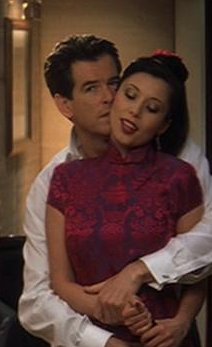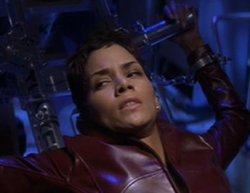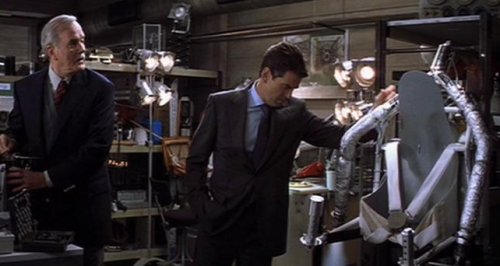And so it goes,
Bond after Bond, as the most durable series in movie history
heads for the half-century. There is no reason to believe
this franchise will ever die. I suppose that is a blessing.
- Roger Ebert in the Chicago Sun-Times (November 2002)
Die Another Day
Film: 2002 (#20)
Book: n/a
Bond attempts to wreck a conflict-diamonds-for-weapons deal in North Korea, dealing with Colonel Moon and his right-hand-man Zao; he is caught because of an MI6 mole, and put in prison and tortured, but not before apparently sending Moon to his death. Eventually he is released; he thinks to be shot, but it is actually a trade for Zao, and as M puts it, it comes at too high a price - Zao is very dangerous and no one wants him loose, but they believe Bond has cracked and has been leaking information (it's the mole again).
Bond escapes his observation cell/hospital bed, and tracks Zao to Cuba, where a clinic does total gene replacement - Zao is there to get a new face and identity, but the mysterious Jinx, a capable woman with an agenda of her own, trashes the facility before it can happen. Zao escapes. Bond gets some diamonds Zao has in a lucky charm around his neck; they are identical to conflict diamonds, but etched with the symbol of Gustav Graves' diamond operation in Iceland. Bond investigates Graves and ends up in Iceland at a demo of Graves' satellite Icarus, which focuses sunlight, creating artificial daytime.
In Iceland Bond finds out that 1. Icarus is actually a weapon; the benevolent aspects are a cover story; 2. as suspected, the diamond mine is fake and is laundering conflict diamonds 3. that Jinx is an NSA op who wants Zao for reasons of her own 4. that Miranda Frost, the MI6 agent who's been in deep cover investigating Graves for three years, is the mole, and 5. that Graves is Colonel Moon, having received a new face from the Cuba clinic. Bond rescues Jinx from a watery death in Iceland (finally finishing off Zao in the process) and they pursue Frost and Graves, who are using Icarus to blast through the minefields in the Korean DMZ so that North Korea can invade. Bond and Jinx kill off the bad guys, then manage to get off the plummeting plane in a wholly improbable way ....
Himself
When I originally wrote the page about this film, it was the last one in the project, and I wrote "Brosnan is looking weary ...." This turned out to be prophetic. Other than that, it's the same as the previous film, only more so. Goes through hell and back with aplomb, but lacks much in the way of good cheer, except in the scene with Q and the one with Raoul the sleeper in Cuba.
The Women
See comments below. Bond tries all kinds of lines on Miranda Frost before he realizes she's a fellow operative; then he's more or less all business. Jinx he treats as a professional equal - pity she's not up to the role. The sequence in the Cuban bar where they exchange really horrible innuendoes, followed by the bedroom scene with the fig, is one of the worst ever committed in a Bond film, and I can't watch it on repeat viewings at all - I barely made it through on the first viewing, in the theatre.
Backstory
New Zealand director Lee Tamahori does the honors, quite well I think. Whatever its other faults, this is a good-looking movie. Purvis and Wade are back, this time without anyone else interfering with their script. David Arnold gets the score again, sadly.
This is the first Bond that contains really significant amounts of CGI. Some people noticed, and complained about it.
Despite having huge sections set in Korea and Iceland, almost all the "Korea" scenes were shot in various places in the UK, and though some of the Iceland exteriors are real, the interiors are not. (Cast and first camera unit never even went to Iceland.) The ice cliff and tidal wave sequence, when Bond rigs an impromptu parasurfing setup, is CGI (this is the part people complain about). "Cuba" is Pinewood plus Spain (couldn't get permissions). The surfing at the very top of the film was shot in Hawaii.
South Korea did not respond well to some aspects of this film, notably the idea of South Koreans taking orders from the American military and Jinx and Bond having (implied) sex in a Buddhist shrine.
The Briefing
I didn't realize the film would take so long to summarize above, but there you have it. Tomorrow Never Dies is a film with lots of action sequences which feels oddly slow; Die Another Day has relatively few big action sequences (after another mini-movie pre-credits sequence - over twelve minutes long - the next big stunt is the fabulous swordfight, nearly an hour into the film) but moves surprisingly fast. Perhaps it is because of all that damned plot.
This is a surprisingly real-world Bond film which is marred by several places where you have to swallow especially large improbabilities. Many of those, fortunately, are not crucial to the plot, but they do tend to add up.
In the real world, De Beers was censured by the world governments for continuing to trade in conflict diamonds from Angola, in 2000, and promised to stop doing it; North Korea is still, to this day, pretty much the only non-Middle Eastern monster in the closet of the western world; the whole North Korean arms-for-diamonds thing is not all that implausible, nor the diamond laundering. Icarus is not so plausible, but we can handle that, and it's a very nice idea - Diamonds Are Forever's gimmick, but done right this time. But then we must swallow the idea of Moon being able to get a completely new face, and that gene clinic is simply not believable.
We also give Bond an invisible car in this one, and although people have lined up to assure me that "adaptive camouflage" is on the brink of being a real technology and is being researched by various militaries as we speak, the fact remains that if you give Bond an invisible car, why not just have him able to fly faster than a speeding bullet and able to leap tall buildings at a single bound? This squandering of a vital "god point" is made even more egregious by the fact that the invisibility of the car isn't actually needed much - the plot could easily have been written to leave it out.
Basically, although picking out Bond implausibilities is pointless, I have problems with a film that asks us to swallow the existence of Icarus, of the gene clinic, the invisible car, a holographic trainer far beyond current capability, and the physics-defying helicopter stunt at the end. Whether it's because the rest of the film is pretty realistic for Bond (which makes the implausibles even more jarring by comparison), or simply because they use one too many of those "god points," this Bond film really pushes me beyond my suspension of disbelief.

"I'm not that kind of masseuse."
"That's all right, I'm not that kind of customer."
Barring all that, though, it's a great film. Almost the entire supporting cast is brilliant, with special note for Rosamund Pike as Miranda Frost - her first film role! The only real weak spot (Mr. Kil doesn't count) is Halle Berry.
Yeah, I know, the Oscar-winner is the only person in the cast I pick on. Am I insane? No. I find Berry poor, very poor, and not just in this film. She does "capable" and "cocky" well, but she's lousy at sultry, seductive, or any genuine emotion. She simply is not all she's made out to be.
This is quite a movie for Bond. Purvis and Wade confirm, in remarks on the DVD, that this is a movie about Bond losing his Bond-ness and having to get it back. Certainly this is the furthest we have ever seen Bond fall from grace in a Bond film (visiting territory that Fleming covered, but the films have always shied away from). Wade notes that some people wanted Bond to escape from the prison, but that wasn't where the script intended to go - which is why they made it clear that this prison was just to hold Bond and he was the only inmate. The idea being that he had to be Bond just to survive it, never mind escaping it. Brosnan, for his part, seems pleased to get an opportunity to show fear, weakness and doubt - watch his response when he thinks he is being taken out to be shot.
The MI6 supporters are of the caliber we've come to expect. Bill Tanner is MIA again, but Charles Robinson is the one who always gets sent out on the field work anyway. The two scenes between M and Bond are tense and are high points of the film. John Cleese proves he really does have the stuff to be Q - another high point. Moneypenny gets a VR scene which I find a poor choice - I'm not saying it's in bad taste, I'm just not sure I find it appropriate to the character. But apparently there were a lot of people desperate for Moneypenny to finally get some reward in that direction - the writers note that they were "surprised by the positive reaction" to the scene. Can't argue with the masses.
Instead of Jack Wade we get Michael Madsen as CIA boss Falco (although IMDb lists his first name as Damien, Madsen says that he never did have another name for the character during shooting ... unlike the allegedly single-named Jinx, whose last name, Johnson, is used in dialogue. Her real first name is Jacinta, but you have to freeze-frame on a medical file in the Los Organos clinic to see it). I miss Wade, but the use of Falco is important because it finally puts the British operations closer to where they actually would be in the world stage. Falco thinks the Brits are incompetent and get in his way, and it's clear from his threats to M that he can bully MI6 and get away with it. This, in addition to Moon's "You British still think you have the right to police the world," gives the film a long-overdue sense of international perspective. I'm sorry, British readers, for harping on this, but face facts.
All in all, a fine final outing for Brosnan.
Obscura
Tamahori is the one who wanted to put a CGI bullet in the gun barrel. Blame him.
I still don't believe a hovercraft could pass over land mines safely until someone tells me otherwise. There is a hell of a lot of air pressure below one, isn't there? At least as forceful as a human footstep?
The titles, for once, almost seem like a part of the movie action. Much has been made about Madonna and her appearance in the film, not usually positive. I like the song, and I don't think she does a bad acting job per se; she is, however, given absolutely horrible lines to read, which I think is the real problem.
Bond's long hair and beard in the prison scenes are not his own, but they're done so well that they look like they could be. The prisoner exchange on the bridge may be a nod to the case of Francis Gary Powers and Rudolph Abel, a trade made because of a suspicion that Powers was leaking information from prison.
Am I seeing Bond smoke a cigar in the Cuba sequences? Well, it's a little different from Dalton chain-smoking cigarettes, but it's still startling given Brosnan's prior statements. Perhaps it's a matter of "when in Rome" ....
The lasers in the diamond mine are allegedly there for diamond-cutting; it strikes me that this would call for small precision mountings, not these enormous mechanical arms. But, you know, the mine's a fake, so maybe the lasers are there strictly to cut up intruders ....
The fabulous escalating swordfight, with heavier weapons and less armor as they go, was a result of the desire to put in such a scene, but the worry that it would bore the audience if played straight. It is anything but boring. The club where this happens is supposed to be called Blades - a good name under the circumstances, but also a nod to Fleming's fictional club of high-stakes cardplayers that features prominently in the beginning of the book Moonraker. In fact the writers acknowledge a desire to specifically pay tribute to the (unused) plot of the book Moonraker - here, as there, the villain is believed to be creating a device for philanthropic purposes which turns out, like the villain, to be something else entirely.
There are many, many deliberate tributes to earlier Bond films in this one, the fortieth anniversary of the franchise and the twentieth film by the EON count. So many that no attempt will be made to list them comprehensively here. The most obvious two are probably Jinx's emergence from the water in the Honey Rider style and the various souvenirs of earlier cases in the Q briefing. But there are many more, some extremely subtle: When Bond escapes from the hospital ship, behind the beeping and booping of various monitors you can hear the electronica from the opening sounds of the Dr. No titles. (I didn't spot this on my own, by the by; it was pointed out to me by a special feature on the DVD. But sure enough, it's there.)
My personal favorite joke is the bird book Bond borrows from Raoul, his Cuban contact. "Birds of the West Indies" is a book by an ornithologist named James Bond, whose name Fleming stole for his character. It's not clear whether the one Bond picked up is actually a copy of that; the name on the cover is (probably deliberately) scratched out. But the joke is there.
Another good one is the stewardess on the British Airlines flight, played by Deborah Moore, Roger Moore's daughter. By the by, "London Calling" is only the third time a recognizable "catalog" song has appeared in a Bond film, and the first time one has been performed by its original artists.
As long as we're on the minor-casting watch, Michael Wilson gets lines once again in his cameo - he's the general in the bunker who says to "mobilize the South Korean troops." He actually gets a cast listing in the credits for this one.
Hotelier/Chinese agent Chang was supposed to be Wai Lin, but negotiations with Michelle Yeoh failed.
Little things I like: Frost's "I'm afraid you'll never have that pleasure" - ouch! And Bond's face shows it. Jinx saying to Frost, "He did you? I didn't know he was that desperate." Also, I confess, I like

"Yo' mama - and she said to tell you she's real disappointed with you."
Frost's assessment of Bond to M is spot-on, especially since M obviously agrees with it and knows perfectly well that's what Bond is for. "Sex for dinner, death for breakfast" is also a good call, and a Fleming reference to boot. (I also like the fact that M knows who her staff is and isn't sleeping with.) The whole Q briefing is filled with good lines - and Bond's reaction to the car is possibly the only time that Q Branch has ever managed to visibly impress him.

"Does this thing still work?"
"It's called the future, 007, so get used to it." But the future wouldn't last. Did someone in high places have the same doubts I've expressed here? Did someone decide the box office had reached diminishing returns for the escalating budgets? Did the movie not get the vital younger audience that was hoped for? Unclear, but what is clear is that when the next Bond came along, it was definitely not more of the same.
« Heavy Bondage
« Opening Titles
All material on this site is under copyright by its author, except for quotations and images used for purposes of commentary (and which belong to their respective owners/authors). All rights reserved. Do not reproduce without express permission. Correspondence goes to projectionist at shrunkencinema dot com. No guarantees. Contents may settle during shipping; this product is sold by weight, not by volume.
These pages and their author have absolutely no affiliation whatsoever with Ian Fleming (Glidrose) Publications, EON Productions, Danjaq LLC, MGM/UA or any other creators of the James Bond novels or films.